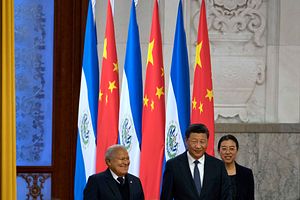On February 13, U.S. National Security advisor John Bolton wrote on his Twitter account that he had had a phone conversation with El Salvador’s President-elect Nayib Bukele, who won the presidency in early February in the first round of voting and brought an end to three decades of two-party rule in the country.
Bolton congratulated Bukele on “his historic victory” and expressed U.S. support. Additionally, he singled out China and Venezuela in their conversation.
“We discussed ways to strengthen the U.S.-El Salvador friendship and to collaborate to restore democracy in Venezuela and counter Chinese predatory practices in the hemisphere,” Bolton tweeted.
Without denying or explaining away Bolton’s remarks on China, Bukele immediately thanked Bolton for his “disposition on strengthening our relationship.”
“The United States will find in El Salvador, not only an ally, but also a friend,” Bukele added, also on Twitter. “…God willing, we will be able to do so much, for the benefit of our people.”
Even before the two had this phone conversation, Bukele had repeatedly vowed to mend relationship with the United States.
In an interview with the Associated Press on February 12, the 37-year-old president-elect said that “El Salvador needs to be friends with the United States. It is an imperative for us.”
Bukele also harshly criticized his predecessors’ policies.
“I believe that the way politics has been done in the country is wrong,” he told the AP. “It has always been based on alliances that don’t have the well-being of the people as their first priority.”
“They make alliances in the (Legislative Assembly) based on things that aren’t ideological, like money under the table, business, group interests,” he added.
Although he didn’t mention El Salvador’s current China policy specifically, what Bukele told the AP seemed to have implied that he is not content with it.
As The Diplomat reported earlier, last August, El Salvador officially cut ties with Taipei and formally established diplomatic ties with Beijing. The move was seen as Beijing’s revenge for Taiwan’s President Tsai Ing-wen’s high-profile stopover in the United States.
Taiwan’s Foreign Minister Joseph Wu later revealed that El Salvador abandoned Taipei for Beijing because El Salvador had been continuously asking for “massive funding support,” but Taipei was “not willing to continue with the money competition with China.”
According to Reuters, Beijing had offered El Salvador about $150 million to develop social projects.
However, El Salvador’s decision to switch its allegiance from Taipei to Beijing had led to rare backfire from the United States.
The White House issued an unusually strong statement slamming both El Salvador and China last August.
“The El Salvadoran government’s receptiveness to China’s apparent interference in the domestic politics of a Western Hemisphere country is of grave concern to the United States, and will result in a reevaluation of our relationship with El Salvador,” the statement said.
Last September, the U.S. State Department even called back its top envoys to the Dominican Republic, El Salvador, and Panama due to those countries’ “recent decisions to no longer recognize Taiwan.”
Now in order to reassure the United States and differentiate his own policy from that of his predecessors, Bukele might have to cool down El Salvador’s relations with China after he takes office.
Notably, at the regular press briefing on February 14, China’s foreign ministry spokesperson, Hua Chunying, rejected Bolton’s remarks on China’s “predatory practices.”
She said that China and El Salvador’s diplomatic ties do not “target or affect either’s relations with other countries” and that China “is glad to see the U.S. and El Salvador developing relations.”
“China has no intention of engaging in geopolitical rivalry in Latin America,” she continued. “The U.S. accusations against China-Latin America cooperation are completely baseless and unreasonable.”

































